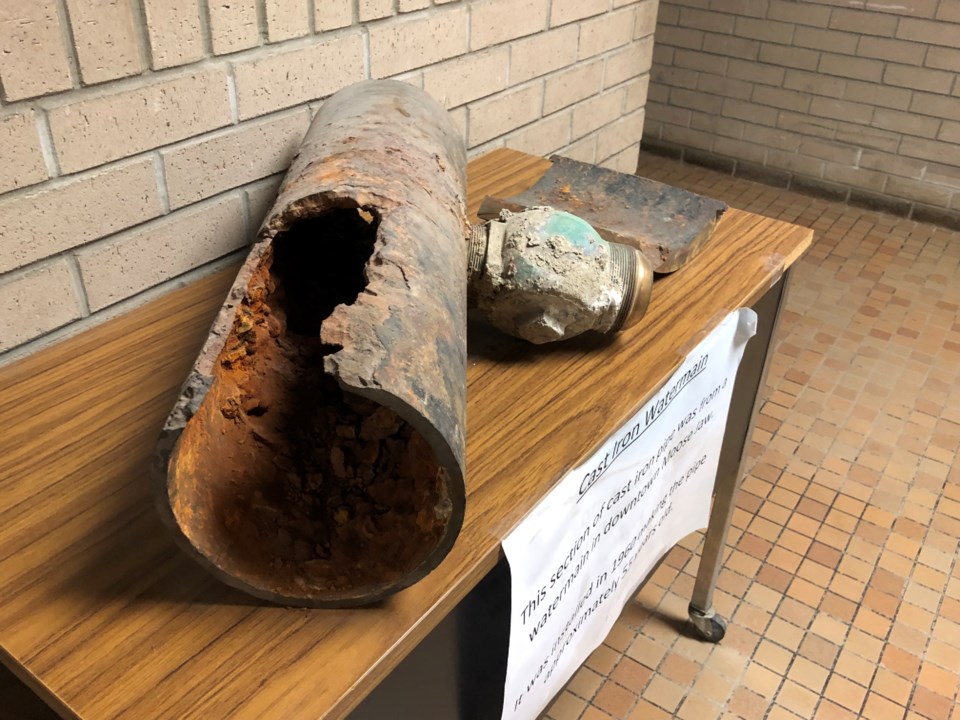It could take 34 years to replace all the cast iron water pipes, based on how many metres are left to replace and how many metres are replaced per year.
The City of Moose Jaw operates 274 kilometres of underground water distribution pipes, with 84 kilometres composed of cast iron. Since 2016, the municipality has replaced 12,490 metres of cast iron pipes, including 2,420 metres in 2016, 2,260 metres three years ago, 3,250 metres two years ago, 1,760 metres last year, and 2,800 metres this year.
This is an average of 2,498 metres replaced yearly.
With 84 kilometres — or 84,000 metres — of cast iron remaining, it will take another 33.6 years to replace it all if an average of 2,498 kilometres is upgraded per year.
City hall has spent more than $27.2 million to replace those pipes, including $4.99 million in 2016, $4.99 million three years ago, $6.8 million two years ago, $4.3 million last year, and $6.05 million this year.
The average cost to replace each metre is $2,200.60.
The goal is to spend $6.6 million in 2021 and then more than $7 million each year during the following four years.
The department of engineering services presented the information during the Dec. 16 budget deliberation meeting. City council voted to receive and file the report, which discusses the replacement program’s history and future objectives.
Council discussion
Coun. Heather Eby wondered what municipal policy was with replacing pre-existing asphalt. She pointed out that city hall paved High Street West this year, only for contractors to dig up the 200 block to connect new businesses to underground infrastructure. That area now has several dips and bumps.
“That’s a very complicated issue,” said city manager Jim Puffalt.
City hall only received a building permit from contractors a day before it planned to pave that street, he explained. It wasn’t realistic to shut down the contractors or delay paving for a month. The municipality can’t anticipate those projects, so property owners are encouraged to speak with the city beforehand.
“… we hate having to come back and dig up a road. There was nothing we could do for this one,” Puffalt said, adding the contractors paid in full to dig up and repair High Street.
Project explanation
The cast iron program’s scope includes water main replacement, hydrant and valve replacement, water and sanitary sewer services, and associated surface works such as the replacement of roads, asphalt and sidewalks, and landscaping as required, explained engineering manager Bevan Harlton. Other infrastructure addressed include catch basins, manholes, deficient sidewalks and other road repairs.
Each program encourages property and business owners to have their private water and sanitary services replaced when the water mains on their property are replaced, he continued. The municipality pays the contractor for the work, while the contractor signs an agreement with the property or business owner. The owner can then put it on his or her taxes or pay it in full.
“While that money is coming back to the water utility, it’s not coming back to that year’s cast iron program,” Harlton said. “So about 10 to 15 per cent of every year’s program is going toward that (private) service replacement.
“This year, we’re sitting at about $650,000 on a contract of $5.8 (million).”
Replacing cast iron pipes also reduces pipe breakages. Since 2016, there have been 462 breaks.
If city hall replaced just the cast iron pipes and affected roads, it would cost $1,800 per metre and enable about three kilometres per year to be fixed, he stated.
“Going beyond the scope that we are moving ahead with, if we were to get into the full Cadillac and just a complete rehab of the whole location, we would be up around $2,800 (per kilometre) and up to about two kilometres a year (replaced),” Harlton said, adding a “full Cadillac” is completing a full road rebuild from top to bottom, fixing sidewalks, and installing wheelchair ramps.
The next budget meeting is Monday, Dec. 21 at 3 p.m.




